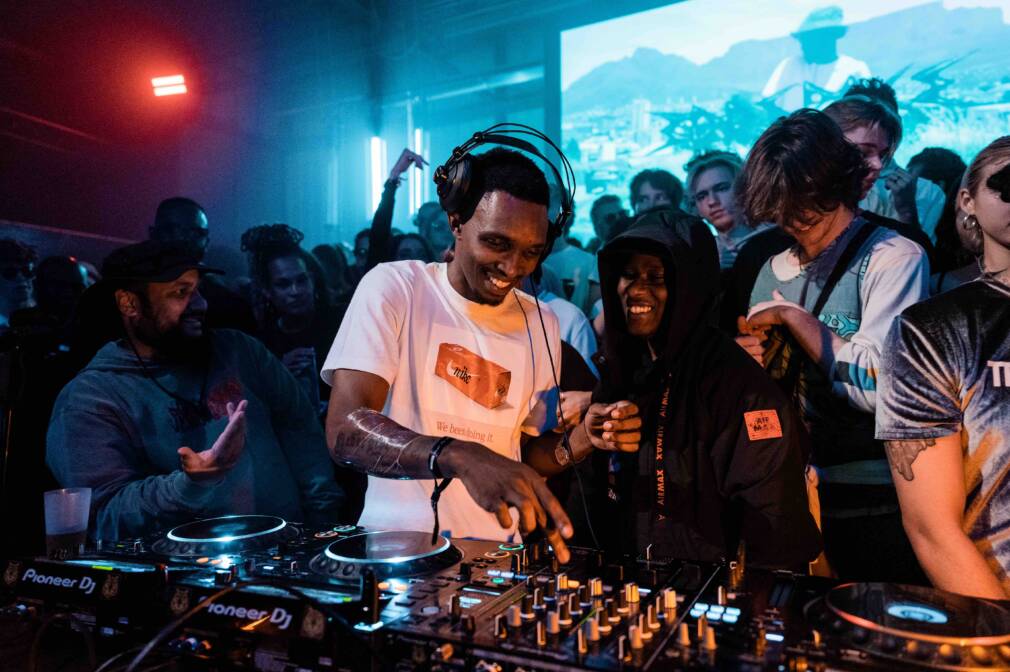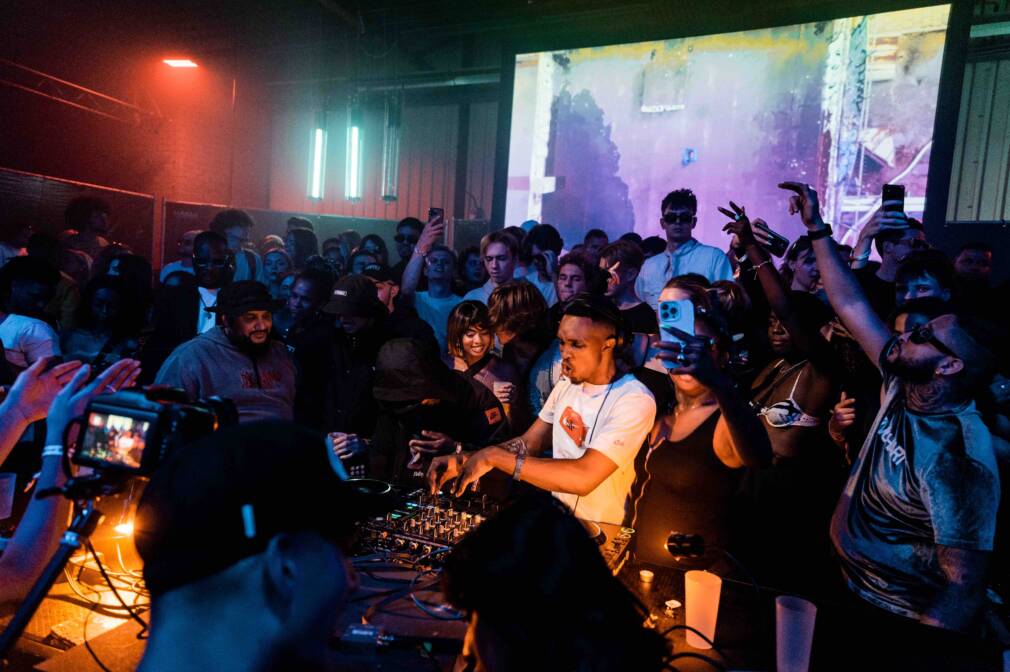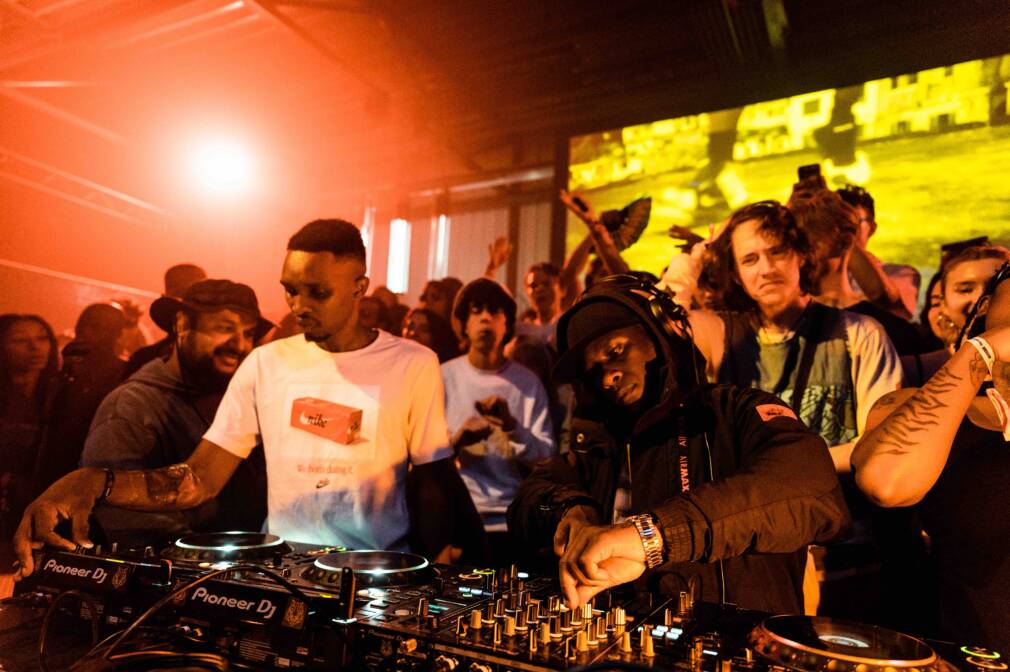The zebra “oiah” is stuck in my head. The throaty howl punched throughout “Flex”. The opening call on “Bless the Earth”. Somewhere far away on “Siyobonga”. It’s Boiler Room Festival Day 1 on a cold Amsterdam night. The club is filling out with fishnets and dark eyeliner. A wide-open hanger with two stages eats the early mass of bodies seeking release, heavy beats and pushy cameos. “wya?” reads a text from Scratcha DVA aka Scratcha aka Scratchclart. Scratcha is here to do a b2b with gqom pioneer, Nyege Nyege signee and Durban native Menzi Shabane. I’ve been listening to the former’s catalog for days. My mind is a jumble with Scratcha’s chaotic productions; tracks with samples that feel like they’re thrown together from different corners of a small room, artifacts from far away places crashing against a wall marked with a child’s growing height. A security guard puts his hand on my chest as I try to enter backstage. Scratcha appears from behind the barrier with a neon wristband in one hand and a bottle of Patron in the other. He’s wearing a big black jacket and dark cap. He leads me to the nearest table and folding chairs and pours us both a tall plastic cup of tequila. The party is already a’rumble with bass and faraway woops and wolps. We mic up and jump into it. I’m here to dissect the gqom, grime connection. Then to witness it in-person.
Gqom got the grime spirit
Slap on Dominwoe’s “Africa’s Cry”, track 1 off the first Gqom Oh! The Sound of Durban compilation from back in 2016, and you’ll get the same dark, evil-tech feeling of Scratcha’s “Reach the Sun” opener from his 2012 Pretty Ugly. “That was my grime era,” Scratcha says with a smile, “and I feel that how grime developed in the UK is how gqom developed. Like the same things happening in two different places. The gqom that the kids are making in Durban, it just reminds me of grime. And how they’re making it.” Scratcha has had his hands in the grime machine for decades now. Pushing the boundaries, slicing up some rhythm & grime like on the landmark The Voice of Grime compilation that put women’s voices front and center or producing genre-bending cult classics like “Kurb Krawl”. Though despite being on major projects like Wiley’s Playtime’s Over, Scratcha’s career is that of a maverick. Just outside the mainstream, with a taste too eclectic to fit neatly in the UK Funky, Grime or Tech House trends. “I like all kinds of music and in the past it’s been to my detriment,” Scratcha admits of his gnarly, potpourri sound.
This sentiment, the outsider mentality that pushed him towards grime, is also what Scratcha saw in gqom. “Someone might disagree with me but my theory is that grime came from by people being shut out of trying to make UK garage,” Scratcha begins, connecting the dots. “So youngins are trying to make garage but didn’t have the supplies, didn’t have the equipment, didn’t have the facilities and it was this grimey sound. It was called grimey garage before it was called grime. In South Africa, the kids in Durban, they’re trying to make house; Afro-house, but at the end of the day, it’s house. But they don’t have the equipment, they’ve just got a laptop, a monitor on their wall or something and that’s it.” Scratcha looks up, “It’s just kids in bedrooms, you know?”
“Durban is all about gqom,” Menchess, a South African gqom producer, said to Dazed Mag back in 2015. “It’s like it’s the only thing they know. In the whole of South Africa, though, it has taken a while for gqom to catch on.” A music born and bred in Durban with roots in South Africa’s groovy house variant Kwaito, gqom has been the outsider music for South Africans and internationals. Meaning “hit” or “drum” in isiZulu, the genre is often overshadowed by the jazzy and more sensual amapiano, or pushed aside as a raw and unpolished breed of club music. “To be honest, I never thought gqom would gain popularity beyond Durban,” DJ Lag once said, surprised by the genre’s growing popularity overseas. But Lag and his contemporaries weren’t making the music to break. They were making it for their streets, block parties and dancehalls, trying to raise the eyebrows of their rougher and grittier entourage. “It sounds different to my ears,” Menzi clarifies, “but it’s more or less the similar with the gqom sound cause it shares the same energy.“
“It’s the same shit.” Scratcha laughs. “They get shut out of that, so they make their own thing. It’s the same with grime. It’s like, ‘Fuck it. You’re not letting us in, we’ll make our own thing then.’ And that’s why me and Menzi are doing this. Because we see that.” Scratcha and I cheers to Menzi, and down another shot.

The South African connection
Although Scratcha first found gqom from the epic aforementioned Gqom Oh! compilations, the whole story is a bit more serendipitous. It’s as if the emergent phenomenon was waiting for a brain like Scratcha’s to tune into the signal. Again, check out Scratcha’s friend and collaborator Terror Danjah’s “Stop Start” from the 2008 Zip Files, years before gqom hit the scene. Or Scratcha’s own New World Order package from 2010. The rhythm, dark ambient undertones and textural thizz are written on the proverbial wall.
And yet, Scratcha’s first trip to South Africa had nothing to do with gqom. Originally Scratcha flew there on a whim, chasing down singer Zaki Abraham who wasn’t replying to calls or texts during the making of his Pretty Ugly album. Dead set on getting her voice on the project, Scratcha booked a ticket and a flat down in Cape Town to track her down. “She started flaking out on me and I just had this mad idea to go and find her. I was like, I need this singer on this album,” Scratcha laughs. With the help of OKZharp, Scratcha was able to find the studio and make “Fire Fly”. But it was later, at a show in Jo’burg, when Scratcha was playing some UK Funky that an artist approached him. “He’s like ‘Yo, Scratcha, see that stuff you’re playin’? It sounds like that stuff that the kids are making in Durban. You need to come to Durban!’’ Scratcha recounts. “And that was then in 2011.” Later that day when someone played him some gqom, the lights went on. “I’m like, oh, that’s what you meant.. this shit. Yeah, we was doing this shit just in a different place.”
After that the collaborations, samples and reinterpretations started rolling in. Some of the most obvious hit around 2019, after some serious marination, like on The Classix EP collab with fellow UK funky mainstay Karen Nyame KG. By 2021’s “Razzclart” and “Murderer’s Reprise” with LR Groove and Razzler Man (the two making Tribal Brothers, a group that’s revved up the BPMs on amapiano and specialized in another sort of UK-South African merger) the sound had sunk its teeth into Scratcha’s work. This all culminates in the Afrotek EP featuring South African singer Mxshi Mo, among others, and brings that serendipitous moment in Johannesburg full circle. “I want to go back there again,” Scratcha says. “Now that I’ve soaked all this up. I want to come back and be like, ‘Hey guys, this is what I made with your stuff.’”
B2b with the gqom sensation
Both several tequila shots deep, Scratcha speaks freely, unraveling UK dancefloor history with names and moments like some kind of human almanac. Stories of growing up on jungle, or going to Music House to cut his first dub plate with Terror Danjah. Seeing Ed Rush there and Optical, and hearing a young and unknown Skepta claim he’ll be bigger than Dizzie Rascal one day. On the subject of Music House, one of London’s legendary dub-plate studios, Scratcha remembers, “I’d go there and cut my little dub with my £35. I’d get to see my heroes and I’m like, you know, if you see your heroes in the same space on a Saturday, you’re doing something good.” With this background it’s no wonder Scratcha has endured, evolved and enamoured listeners. “I’m constantly listening to music all the time. I’m consuming it from morning to night. My mum always had music on in the house, even when we was watching TV,” he says of his tune-soaked past.
All of it brought us here. Waiting in the ice-cold hanger, the homie Jlsxndrs sitting next to us, dropping his own grimey footnotes. A massive b2b a few hours away. Another small notch on the belt of a DJ and producer for whom this has become like clockwork. But that doesn’t mean the man still can’t be impressed. When asked about Menzi, Scratcha replies, “I personally think he’s crazy. I think he’s mad. He’s on some, Aphex Twin, Mad Planet level of thinking.” No arguments here. I first saw Menzi at a Nyege Nyege party in Paris some years ago and was totally floored. I went on to follow him from Utrecht to Uganda, nailing down a mini-doc and running out to buy him a whistle after he lost his because, in his hands, it seemed like some kind of party super-weapon. Each set is hypnotic, trance-inducing madness.

To give a proper rundown of his b2b partner, Scratcha waxes poetic with an analogy about Chicago’s footwork scene and uses a cosmic metaphor. “So it’s like Teklife… Sorry to jump around,” Scratcha says with a grin, “but it’s like footwork and Teklife and you know? You got all the footwork guys in Chicago and they all have their own different layers of how they wanna do stuff, right? You got DJ Spinn, Rashad, you got RP Boo and everyone’s got their own little something, but it’s all the same stuff. Same with gqom, right? You got Citizen Boy, Lag, Omagoqa… But Menzi is on another planet. It’s like, you guys are in all these planets here, but I’m actually in a different universe doing your thing. And that’s how I see him. He takes it and stretches it as far as it can go to make it so you can’t even call it gqom at this point. That’s what I like about him.”
Kindred spirits? There’s a line to be drawn between Scratcha’s studio beginnings with Orange Productions, recording live dhol drums and sarangis for the label’s bhangra music by day, and bringing in grime MCs at night, and Menzi secretly picking up samples from his father’s work as a traditional healer in their home to use later in his gqom productions. Both have a sensibility for the odd and incredible sounds of the world and a willingness to integrate them. In any case, the respect is mutual. Menzi adds, talking about his first time running through Scratcha’s catalog, “I was listening to his old stuff, and I was like, yeah, this shit is crazy!” Not to mention the duo’s mind-bending EP, Drmtrk Re:clarted with wild fusions including the Menzi remix of “Whoo Hoo”. Word is there’s another 4-track project on the way.
Gqom vs grime live and direct
Scratcha and Menzi take the stage at around 4AM for the closing set. Menzi has a wide grin and his iconic whistle in-pocket. Menzi kicks it off with some heavy and forceful gqom. Scratcha responds with some wild gqom, dancehall in-and-outs. The whole house is bouncing. There’s a moment when Scratcha takes the center and nosedives into some sound experiments, working the control like a mad engineer racing against the clock. Menzi turns around and looks at me with a laugh on his face. “This guy is totally insane,” he says with joy. B2b in and out again for the next few hours that move far too quickly. Tracks from DJ Lag, DJ Polo, Griffit Vigo and originals… Scratcha finished the whole thing with some ambient R&B track to cool everyone off, another left-field moment for the club maverick. In the end it wasn’t gqom vs grime, South Africa or the UK. It was two inspired artists throwing sound at each other, sometimes with a brick, other times with a pin drop. The only undeniable is that it looked and felt like too much fucking fun and I was way too close to the action.
After the set I found Scratcha and Menzi palling it up backstage. The party was well on its way. The crew started to kick everyone out, overstaying the welcome. Boiler Room Day 2 was already upon us. I said goodbye to Scratcha and he and his entourage went into the Amsterdam night. Surely off to break necks with some Dancehall Riddims or Future Funk. Gqom and grime had their night. But there’s always more to come. Fuck. Just remembered. I chase Scratcha down. I almost forgot to ask. That “oiah” sound? It’s everywhere. What is it? Where does it come from? “It’s an old kwaito sample,” he tells me, not remembering the exact tune. “Then someone from gqom sampled it, and I sampled the gqom track…” Of course. The rabbit hole always goes deeper.




